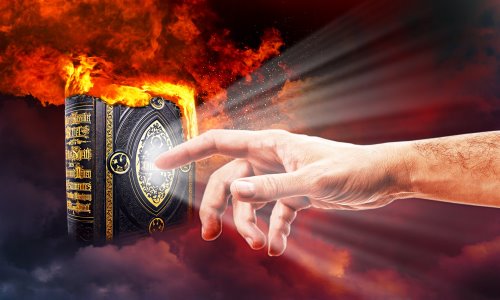
Read This One Chapter Carefully
Let God's Word Teach You The Truth About Resurrection And What Happens When We Die
1 Cor. 15:1. Moreover, brethren, I declare unto you the gospel which I preached unto you, which also ye have received, and wherein ye stand;
The brethren here are no doubt both the Jewish and Gentile believers of the church. We do note that chapters 10 and 11 were written to the Jewish believers and that 12 was written to the Gentiles. The Jews were told how to observe the Passover, and the Gentiles how to use the gifts. But here is a gospel that must be to both. The gospel that Paul preached in those days was twofold according to what we read in Acts 26:16 ; The things which he had seen the 12 and others preaching, and a new gospel which was to be revealed to him. So Paul was preaching the coming kingdom to the Jews as were the 12, and the same message to the Gentile believers with the exception that they should walk by grace and not by the law. This gospel of the uncircumcision was sanctioned by the council at Jerusalem ( Acts 15). See Gal 1 for the call to preach this particular gospel.
1 Cor. 15:2. By which also ye are saved, if ye keep in memory what I preached unto you, unless ye have believed in vain.
If we keep in mind that Paul went to Synagogues and preached to the Jews first, Jews who had the Scriptures and believed them, we can see that he was not preaching a gospel of salvation, as we think of the term today. These folks already believed God. But not all who believed God were members of the kingdom. So their salvation was that they were preserved for the kingdom. It was not a question of a present possession of everlasting life, although that was important too. But the primary work of the 12 was to proclaim the kingdom (Acts 1:3,6).
1 Cor. 15:3. For I delivered unto you first of all that which I also received, how that Christ died for our sins according to the Scriptures;
The OT foretold that the Messiah should come to take away the sins of Israel. He was called Jesus for He was to save His people (Israel) from their sins to the intent that they might fulfil the purpose for which they were chosen, i.e., to be a witness and channel of blessing to the nations.
1 Cor. 15:4. And that He was buried, and that He rose again the third day according to the Scriptures;
Paul is proving that Jesus of Nazareth was the Messiah of Israel because of what Scripture said.
1 Cor. 15:5. And that He was seen of Cephas, then of the twelve;
Paul is reciting facts which he could have learned from the 12. They were facts of history. But Paul was inspired to write them regardless.
1 Cor. 15:6. After that, he was seen of above five hundred brethren at once; of whom the greater part remain unto this present, but some are fallen asleep.
More historical facts. Proof of resurrection.
1 Cor. 15:7. After that He was seen of James; then of all the apostles.
This was not done in a corner. There were many witnesses. But not one of them an unbeliever. His enemies never saw Him again and never will.
1 Cor. 15:8. And last of all He was seen of me also, as of one born out of due time.
It is quite likely, from these words and other references, that Paul never saw the Lord till on the Damascus road. And on that occasion Paul saw the risen Lord. So he too could witness to the resurrection of Christ. Now as for the expression that he was born out of due time or was an abortion, he either meant that he was insignificant as a person, not to be counted, or that he was born before-time since he was an apostle to the Gentiles and that commission was given to the 12 to perform in the millennium ( Matt 28:18-20).
1 Cor. 15:9. For I am the least of the apostles, that am not meet to be called an apostle, because I persecuted the church of God.
The 12 had an advantage over Paul in that they were with the Lord from the beginning of His ministry. Further than that, he had been a persecutor. In persecuting the church, he had persecuted the Lord ( Acts 9:4). So Paul felt that he had no credentials whatsoever for being an apostle.
1 Cor. 15:10. But by the grace of God I am what I am: and His grace which was bestowed upon me was not in vain; but I labored more abundantly than they all: yet not I, but the grace of God which was with me.
Note that Paul takes no credit to himself for anything he may have accomplished. It is all by the grace of God. Paul had exercised faith and God had worked thru him. He still does this work thru believers today, if they will allow Him.
1 Cor. 15:11. Therefore whether it were I or they, so we preach, and so ye believed.
In other places, we find that Paul is never one to be jealous, but ever zealous in the work. It mattered not whether these Corinthians believed because of his ministry or that of others. The main thing was that they believed.
1 Cor. 15:12. Now if Christ be preached that He rose from the dead, how say some among you that there is no resurrection of the dead?
Note the terms carefully. Paul never proclaims the resurrection of the body. It is the resurrection of the dead. Evidently, some in the church at Corinth had been holding and teaching that the dead do not rise and that they will never live again. Job had asked this very question ( Job 14) and then answered it for himself and his faith, that he would answer when the Lord called.
1 Cor. 15:13. But if there be no resurrection of the dead, then is Christ not risen.
This is a perfectly logical conclusion. If there is no resurrection of the dead, then there can be no exception to the rule.
1 Cor. 15:14. And if Christ be not risen, then is our preaching vain, and your faith is also vain.
That God should be dead is no new doctrine. Here Paul meets it in the wickedest city in the world.
1 Cor. 15:15. Yea, and we are found false witnesses of God; because we have testified of God that He raised up Christ: Whom He raised not up, if so be that the dead rise not.
A few verses before, Paul established the resurrection of the Lord because the Scriptures foretold it, that He was seen by Cephas, the 12, by more than 500 brethren, by His brother James, and lastly by Paul. Now if the resurrection of Christ is a fact, how silly to claim that the dead rise not! If no first fruits, then no harvest. And if He is not raised then the whole gospel is a fable and there is no salvation. And if that be so, then why should they be baptized for a dead Christ? See verse 29. This would make Paul a counterfeit martyr or witness as it is translated.
1 Cor. 15:16. For if the dead rise not, then is not Christ raised.
There is either a resurrection or there is no resurrection. There can be no halfway measures.
1 Cor. 15:17. And if Christ be not raised, your faith is vain; ye are yet in your sins.
In the OT the proof that a sacrifice was accepted was fire coming down and burning it. The proof that Christ was accepted as the sacrifice for sin and for sins was that God raised Him from the dead ( Rom 4:25). So if Christ were not raised, then sins have not been taken care of at all.
1 Cor. 15:18. Then they also which are fallen asleep in Christ are perished.
This was written long before Christendom had taken on the heathen concept that man has an immortal soul that cannot die. Paul believed the Scriptures which testify that death is a return of the whole man, the soul, to dust. To the bulk of Christendom today the resurrection means very little since they believe that man's existence is uninterrupted and that his future then is either to live in misery or to live in happiness.
1 Cor. 15:19. If in this life only we have hope in Christ, we are of all men most miserable.
If this life is all there is and death ends all, then we who spend our lives being persecuted because we are believing and teaching The Word have wasted our lives when we should then have partaken in let us eat and drink; for tomorrow we die.
1 Cor. 15:20. But now is Christ risen from the dead, and become the firstfruits of them that slept.
In the original language in both the OT and NT the word sleep is used only for those who expect to awake in resurrection. Note the usage in verse 6. And if Christ be the firstfruits, then the harvest will be similar. This bars any resurrection of those who do not believe and have life.
1 Cor. 15:21. For since by man came death, by man came also the resurrection of the dead.
Adam brought in death by sin and was thus denied the right to the Tree of Life. Christ came as a life-giving spirit which the Tree of Life foreshadowed.
1 Cor. 15:22. For as in Adam all die, even so in Christ shall all be made alive.
All of me that came from Adam, my body, my soulical nature, must die. All of me that came from Christ, the new nature, will be resurrected.
1 Cor. 15:23. But every man in his own order: Christ the firstfruits; afterward they that are Christ's, at His coming.
This of course refers to those who are made alive as mentioned in the preceding verse. Those who are made alive are those that are in Christ and are Christ's. Since Christ is the firstfruits, we can only conclude that the harvest that shall follow shall be like Him, not unbelievers or the ungodly (See Psalms 1:5). At the writing of this epistle, the earliest resurrection that Paul knew about was that at the coming of the Lord, when the last trumpet sounds (Rev 11:15). He did not know then about the earlier resurrection he mentions in Phil. 3:11. That is a part of the mystery.
1 Cor. 15:24. Then cometh the end, when He shall have delivered up the kingdom to God, even the Father; when He shall have put down all rule and all authority and power.
The end mentioned here is the word that means a fulfillment, not the cessation of something. So the goal will be reached when all power, rule, and authority are put down, even death itself. There will no longer be any need for delegated rule in the earth and so God will abdicate as Son and rule as Father. Although this is begun by the resurrection just before the millennium, it will not be finished until the end of the millennium or maybe much later.
1 Cor. 15:25. For He must reign, till He hath put all enemies under His feet.
There are some who wishfully think that Christ will win all to Himself and that none will be destroyed. But when enemies are put under the feet of a victor, they are not converted to be friends. There is destruction in its strongest usage in connection with this.
1 Cor. 15:26. The last enemy that shall be destroyed is death.
Note that destroyed here is the same word as put down in verse 24. Now if all the ungodly and the wicked and the unbelievers are to be converted someday and saved, then so will death. For the same word is used of it.
1 Cor. 15:27. For He hath put all things under His feet. But when He saith all things are put under Him, it is manifest that He is excepted, Which did put all things under Him.
That is, God has put all things under the feet of Christ. In Matt 28:18 the Lord said, All power is given unto Me in heaven and in earth. But we do not see it manifested yet. That time will come.
1 Cor. 15:28. And when all things shall be subdued unto Him, then shall the Son also Himself be subject unto Him That put all things under Him, that God may be all in all.
At the beginning of the millennium Christ will take this power that is given to Him and reign till all has been subjected to Him. Then He will in turn be subject to the Father. This repeats what we find in verse 24. The rule will be universal.
1 Cor. 15:29. Else what shall they do which are baptized for the dead, if the dead rise not at all? why are they then baptized for the dead?
In the latter part of the verse before, we have the goal of the ages, that God may be all things and that He may be in all. Now the argument in verses 13 to 19 is taken up again. If Christ be dead, then what profit to be baptized for a dead Christ? Why should one do it?
1 Cor. 15:30. And why stand we in jeopardy every hour?
If Christ is dead, then Paul wants to know what would be the sense of him risking his life for a gospel that has only a dead Christ. And the same for those with him. What profit?
1 Cor. 15:31. I protest by your rejoicing which I have in Christ Jesus our Lord, I die daily.
Paul says that he affirms this by boasting in them who are his fruits and adds that he risks death day by day. This is for the gospel.
1 Cor. 15:32. If after the manner of men I have fought with beasts at Ephesus, what advantageth it me, if the dead rise not? let us eat and drink; for tomorrow we die.
Paul here refers to the mob at Ephesus as being like beasts. He again asks what advantage it would be to him to do all this if the dead rise not (including Christ). We might just as well take the philosophy of the ungodly and enjoy ourselves for when we die, that is the end of it.
1 Cor. 15:33. Be not deceived: evil communications corrupt good manners.
This is a bit awkward as it is. But it means that associating with evil companions will corrupt or spoil good morals. An old Greek proverb.
1 Cor. 15:34. Awake to righteousness, and sin not; for some have not the knowledge of God: I speak this to your shame.
Return to sobriety of mind which is right, and do no sin. This is the gist of it. Then he adds that there are some among them who have no knowledge of God. Theirs must be an empty profession. There were hypocrites as early as that. And it is a shame that in a church there should be those who do not know God.
1 Cor. 15:35. But some man will say, How are the dead raised up? and with what body do they come?
This question is much debated yet today. We know that the Lord had a body that was resurrected spiritual and holy and could do amazing things like appear and disappear so shall the believers. We found in verse 22 that all or everything in Adam dies. Only that which is in Christ (the new creation) will be made alive. Now what is this that is made alive? It cannot be the old body but the new.
1 Cor. 15:36. Thou fool, that which thou sowest is not quickened, except it die:
In nature, we see the grain put into the ground, and if it has a living germ in it, it comes up; but the grain itself dies. So the man who has everlasting life dies, but resurrection follows.
1 Cor. 15:37. And that which thou sowest, thou sowest not that body that shall be, but bare grain, it may chance of wheat, or of some other grain;
Here is an analogy. Putting away the dead is like sowing seed. Note that this bare grain is like unto the unclothed state which Paul wanted to avoid, if possible (2 Cor 5:3,4). It is also supposed here in this illustration that the seed has in it the germ of life. And if there is to be a resurrection, a new body, this same thing must be true of the dead. They must have life.
1 Cor. 15:38. But God giveth it a body as it hath pleased Him, and to every seed his own body.
We do not know how God raises the dead. We do not know what the new body is like except for the example of Christ. The only descriptive terms we have of it are immortal and incorruptible. And also each seed brings forth its own kind. No evolution or change here. And so in the resurrection, each person will have his own form and personality.
1 Cor. 15:39. All flesh is not the same flesh: but there is one kind of flesh of men, another flesh of beasts, another of fishes, and another of birds.
This is correct according to science. This fact also makes evolution impossible.
1 Cor. 15:40. There are also celestial bodies, and bodies terrestrial: but the glory of the celestial is one, and the glory of the terrestrial is another.
This means to say that there are heavenly bodies and earthly bodies. They differ in glory. This is again an analogy showing that as there is a difference in the glory of stars and the like from the earth, so there is to be a difference in glory in those resurrected: Not all will be alike.
1 Cor. 15:41. There is one glory of the sun, and another glory of the moon, and another glory of the stars: for one star differeth from another star in glory.
Here we are not told why there should be a difference in glory of resurrected ones. But we might well guess, for not all receive the like reward.
1 Cor. 15:42. So also is the resurrection of the dead. It is sown in corruption; it is raised in incorruption.
Here is the difference in the analogy. That which God raises is incorruptible. That is not true of the grain that comes up. So the likeness here ceases. Again we can see that those who have not life are not in this picture. Only those who believe will be raised to immortality and incorruption. Grain that does not have life rots and is gone.
1 Cor. 15:43.It is sown in dishonor; it is raised in glory: it is sown in weakness; it is raised in power:
The body we now have is in dishonor. That is why we clothe it. We shall be clothed in glory in the resurrection. Now we are in the weakness of the flesh, subject to all its temptations. But then, when all that comes from Adam has died, there will be a possession of power undreamed of here. Dishonor and weakness will be exchanged for glory and power. Only that which is in Christ will be made alive.
1 Cor. 15:44. It is sown a natural body; it is raised a spiritual body. There is a natural body, and there is a spiritual body.
Here the analogy between the body and seed that is sown ceases. The seed produces a plant like the one from which it came. But the body that is sown is a soulical body, with appetites and senses. The resurrection body is a spiritual one. We have a sample of its nature in us when we have the new nature which is implanted in all believers. This spiritual body is not made with hands (2 Cor. 5:1), which is another way of saying that it is not made of earthly materials which are corruptible.
1 Cor. 15:45. And so it is written, The first man Adam was made a living soul; the last Adam was made a quickening spirit.
Adam did not have a soul, but was a soul (Gen 2:7). The last Adam, Christ, became a quickening spirit and will quicken or raise whom He will (John 5:21). There is a difference between soul and spirit.
1 Cor. 15:46. Howbeit that was not first which is spiritual, but that which is natural; and afterward that which is spiritual.
This statement is very unorthodox and no doubt has been cut out of many a Bible. The tradition is that Adam was made spiritual and died a spiritual death (which is an absurd expression). This states plainly that Adam was created a natural or soulical man with natural senses and appetites. No doubt he would have had a change someday if he had passed his probation exams. But sin and death overtook him and so after nearly 6,000 years Adam has not become a spiritual man yet. He will be a spiritual man in resurrection.
1 Cor. 15:47. The first man is of the earth, earthy: the second man is the Lord from heaven.
This simply repeats what we read in Genesis 2. Adam was made of the dust of the ground. He was earthy. He was closely related in that particular to the beasts who were made of the same material. The second man is from heaven. It is probable that the words the Lord should be omitted here as they do not appear in any ancient texts. Note the play on first and last Adam, and first and second man. One earthy; the other heavenly.
1 Cor. 15:48. As is the earthy, such are they also that are earthy: and as is the heavenly, such are they also that are heavenly.
As Adam was, so are those that are in Adam. And as Christ is, so also will be those who are in Him and will be made alive. Then those in Adam are like Adam; and those in Christ like Christ.
1 Cor. 15:49. And as we have borne the image of the earthy, we shall also bear the image of the heavenly.
Paul is here speaking to believers only. They have been in the likeness of Adam; someday they will be in the likeness or image of Christ. The goal is that we are conformed to the image of the Son. All this argument brings out the reason and the goal of resurrection. When all believers are raised in the likeness of His Son, then God will have many sons. This will add to His glory.
1 Cor. 15:50. Now this I say, brethren, that flesh and blood cannot inherit the kingdom of God; neither doth corruption inherit incorruption.
Even if Adam had not sinned, he could not have come into spiritual blessings, and a place in God's perfect economy to come, without a change of some kind. For he was flesh and blood, mortal and natural (not spiritual). So this verse plainly says that the kingdom is not inherited by unchanged people. Job looked for a change, but he does not have a part in the kingdom. And today the church also must have a change if it is to inherit the heavenly sphere. This verse holds a great and vital truth. Corruption does not inherit incorruption.
1 Cor. 15:51. Behold, I shew you a mystery; We shall not all sleep, but we shall all be changed.
This is not the mystery that was hidden from ages and generations. It was a little secret that Paul was imparting to these particular believers all about themselves and Paul. It was that during their lifetime the Lord would come and be the resurrection for the dead believers and life for the living believers (John 11:24-26). And according to the prophecy of the 70 weeks in Dan 9, this would be in their lifetime for it would have been about 85 A.D. All believers will be changed.
1 Cor. 15:52. In a moment, in the twinkling of an eye, at the last trump: for the trumpet shall sound, and the dead shall be raised incorruptible, and we shall be changed.
This will be instantaneous, not a product of evolution or man's work. It will be a, work of the Creator. For the time of the last trump, see Rev. 11:15. It is after the tribulation (Cf Matt. 24:29). Can you find any reference where the dead are raised corruptible? Resurrection is a grand and glorious thing but for God's people only.
1 Cor. 15:53. For this corruptible must put on incorruption, and this mortal must put on immortality.
Up till now, Christ is the only one who has done this. He alone has immortality. We do not speak of God as being either corruptible or incorruptible. His nature is not in these categories. Christ's body was mortal and corruptible, but because it was a holy thing, it was not allowed to see corruption but was raised before the 4th day.
1 Cor. 15:54. So when this corruptible shall have put on incorruption, and this mortal shall have put on immortality, then shall be brought to pass the saying that is written, Death is swallowed up in victory.
This chapter was never written by a Sadducee! They did not believe in resurrection. And this chapter is not believed by many today who rest in their own works and say that God is dead. This is quoted from Isaiah 25:8. When men become immortal and die no more, then there will be no more death. Note that in the context of Isaiah there is the wiping of tears from eyes. No death, no tears. If no death, then there is no sin, for it is the cause of death. Plainly, resurrection is the victory over death. But not all have the victory.
1 Cor. 15:55. 0 death, where is thy sting? 0 grave, where is thy victory?
To all intents and purposes, up till the resurrection of Christ, the sting of death was fatal and final. Although many had faith and believed unto life and resurrection, actually that resurrection was not possible till Christ was raised for or because of their justification. The sting of death touches all that is of Adam, but cannot touch the new nature which is implanted in the believer. Just as all who are in Adam die, even so, all who are in Christ will be made alive, and resurrected.
And this verse is the only time that Paul ever used the word hell. But it is translated as grave. The gates or doors of hell cannot hold those who are His when He calls. They will come forth. This is the victory. The texts read death instead of grave, but it makes little difference.
1 Cor. 15:56. The sting of death is sin; and the strength of sin is the law.
The sting of death, or rather the sting that causes death is sin. By one man sin came into this world and by sin came death. Man came to know sin by the law, so then Paul says that the stronghold of sin is the law, and the law demands death for sin. But eternal life and resurrection are the gift of God, made possible by the blood of Christ.
1 Cor. 15:57. But thanks be to God, Which giveth us the victory through our Lord Jesus Christ.
By the finished work of Christ, we have the victory. We should give thanks to God Who gave His only Begotten Son so that we might have life instead of death, that we might live instead of perishing. Without the shedding of blood, there could have been no redemption. Unending death would have to be our portion. God has provided the way out.
1 Cor. 15:58. Therefore, my beloved brethren, be ye stedfast, unmoveable, always abounding in the work of the Lord, forasmuch as ye know that your labour is not in vain in the Lord.
Here is the conclusion. It hinges on the word, therefore. Because of all the things that have gone before, they are to be steadfast and immovable in the faith. The certainty of resurrection for the believer leaves no room for doubts and fears. There should be no delay or hesitancy in the work. They have the victory already. So they can then labor for the reward, and that labor is not in vain or for nothing if resurrection is certain.
This is one of the greatest chapters in the Word of God. The theme is resurrection of those that are Christ's. It is a message of hope and joy. And those who are in the administration of the mystery have a similar hope of resurrection, but to a different sphere of blessing. When this epistle was written the doom of Isaiah 6 had not yet fallen on Israel and the Salvation of God .sent to the Gentiles. They do not wait for the last trump to sound for their hope to be realized. This is brought out in the prison epistles, especially Ephesians and Colossians. But the hope of all administrations is resurrection.




























